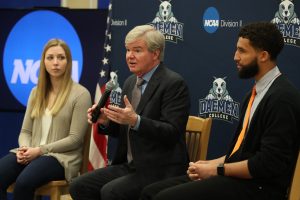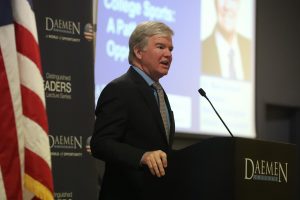As the top leader in U.S. collegiate sports, NCAA President Mark Emmert gave an insightful national perspective on how college athletics serves as a pathway to opportunity and lifelong success at a special lecture presented at Daemen College.
Addressing a capacity crowd, Emmert was the featured speaker in a Daemen Distinguished Leaders Lecture Series event held on May 4.
“As an organization, the NCAA has core values that are inherent in what we do to develop well-rounded student-athletes who are successful in their college studies and in athletic competition,” said Emmert, who has served as NCAA’s president since 2010. “In Divisions I and II, we have found that student-athletes have higher graduation rates than the rest of the student body, a rate that shows we are providing these students the best combination of athletics opportunities and the tools they need to excel academically.”
Emmert noted that the NCAA today is made up of more than 1,120 colleges and universities, nearly half a million college athletes, and 19,500 teams, as compared to the NBA’s 30 teams with 450 athletes.

(L-R) Women’s basketball player Rachel Pawlak, NCAA President Mark Emmert, and men’s basketball player Giambattista Davis.
“It is our goal to provide young men and women the opportunity to play at the highest level of sports competition, get an education, and then send them on to their careers happier and healthier than they were before because of their college experience,” said Emmert. “Participation in college sports teaches values and life skills that with a college education help prepare student-athletes for future success.”
Prior to the lecture, Emmert spent time with Daemen student-athletes at an on campus town hall, where he talked about areas of priority for the NCAA.
“We are focused on supporting academics, the health and well-being of student-athletes, and having a structure in place that stresses fairness,” said Emmert. “At the NCAA, these three things are the hallmark of what our organization is about for student-athletes across the country.”
When taking questions from Daemen student-athletes, he fielded inquiries on a range of topics, from student-athletes pursuing professional sports careers to opportunities for international student-athletes to his role as NCAA president and the challenges of overseeing such a vast organization.
- Women’s soccer player Andrea D’Sa.
“There are huge differences in the size and economics or budgets of the colleges and universities in the NCAA’s three divisions,” said Emmert. “However, what does not vary are our top priorities that apply to institutions of any size, whether it is a small college of 1,200 or a large university of more than 60,000 such as Ohio State.”
During his visit to the Buffalo Niagara region, Emmert toured Buffalo’s Theodore Roosevelt Inaugural site in homage to the president who was instrumental in the roots of the organization, which was established in 1906.



